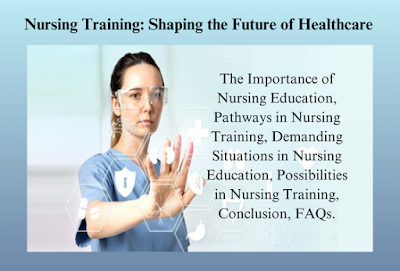The Future of Healthcare
Future of Healthcare Nursing education is vital in preparing healthcare professionals to meet the ever-evolving needs of the medical industry. As the backbone of healthcare, nurses must undergo comprehensive training to provide high-quality care with compassion and skill. This article explores the importance of nursing education, various pathways, challenges, and opportunities that will shape the future of the profession.
The Importance of Nursing Education
Nursing education is crucial for several reasons:
- Skill Development: It equips future nurses with essential clinical skills, such as patient care, medication administration, and the ability to work with advanced medical technology.
- Critical Thinking: Nurses are trained to make informed decisions in high-pressure situations, fostering problem-solving and analytical thinking.
- Ethical Responsibility: Nursing education instills professionalism and a strong sense of ethics, ensuring trust and high standards in patient care.
Pathways in Nursing Training
There are multiple educational pathways to become a nurse, each offering unique opportunities:
- Licensed Practical Nurse (LPN)/Licensed Vocational Nurse (LVN):
- Duration: 1 year
- Role: LPNs and LVNs manage basic nursing tasks under the supervision of RNs and doctors.
- Associate Degree in Nursing (ADN):
- Duration: 2–3 years
- Role: ADN graduates can take the NCLEX-RN exam to become Registered Nurses (RNs), allowing them to enter the workforce quickly.
- Bachelor of Science in Nursing (BSN):
- Duration: 4 years
- Role: BSN graduates receive more comprehensive training, including leadership, research, and community health, which many employers prefer.
- Master of Science in Nursing (MSN):
- Duration: 2–3 years
- Role: This advanced degree is for RNs seeking specialization in roles like nurse practitioners, nurse educators, or nurse administrators.
- Doctorate Programs (DNP and Ph.D. in Nursing):
- Duration: Several years beyond an MSN
- Role: DNPs focus on clinical practice, while Ph.D. graduates contribute to nursing research and academia.
Challenges in Nursing Education
Nursing education faces several challenges that need to be addressed for the profession to thrive:
- Faculty Shortage:
- Many nursing programs face a shortage of qualified instructors, limiting student admissions. This issue is exacerbated by the impending retirement of experienced nurses, creating a gap in nursing education.
- Integration of Technology:
- As healthcare technology evolves, nursing curricula must adapt. This requires significant investment in resources and training to ensure students can work with modern medical equipment and systems.
- Diversity in Nursing:
- Efforts must be made to recruit and support students from diverse backgrounds to create a nursing workforce that reflects the patient population. Addressing financial barriers, providing mentorship, and fostering inclusive learning environments are essential steps toward this goal.
Opportunities in Nursing Training
Despite these challenges, there are several promising opportunities for enhancing nursing education:
- Inter-Professional Education:
- Collaborative learning between students from different healthcare disciplines improves communication, teamwork, and patient outcomes. This trend is gaining traction in nursing education.
- Hybrid Learning Programs:
- The rise of online and hybrid nursing programs makes education more accessible, particularly for working adults and those in remote areas, helping to address the nursing shortage.
- Evidence-Based Practice:
- The emphasis on evidence-based practice in nursing education ensures that graduates are equipped to provide research-informed care. By fostering lifelong learning, nursing programs can prepare nurses to stay current with the latest medical advancements.
Conclusion
Nursing education is a critical component of the healthcare system, directly impacting patient care and healthcare delivery. Addressing the challenges and embracing the opportunities in nursing education ensures that the next generation of nurses is prepared to meet the ever-changing demands of the profession. Investing in nursing education is an investment in the future health and well-being of communities.
FAQs
Q: What are the main pathways in nursing education?
A: Common pathways include Licensed Practical Nurse (LPN), Associate Degree in Nursing (ADN), Bachelor of Science in Nursing (BSN), Master of Science in Nursing (MSN), and doctoral programs such as Doctor of Nursing Practice (DNP) and Ph.D. in Nursing.
Q: Why is nursing education important?
A: Nursing education is crucial as it provides future nurses with the necessary knowledge, skills, and ethical foundation to deliver high-quality patient care and make informed decisions.
Q: What are some challenges in nursing education?
A: Major challenges include a shortage of nursing faculty, the need to integrate advancing technology into curricula, and the importance of fostering diversity in nursing programs.
Q: What opportunities exist in nursing education?
A: Key opportunities include inter-professional education, the growth of hybrid learning programs, and a greater focus on evidence-based practice.
Q: How does nursing education impact patient care?
A: Nursing education ensures that nurses are well-prepared to deliver informed, compassionate care, ultimately improving patient outcomes and the overall healthcare experience.
Read More : https://nurseseducator.com/the-role-of-clinical-practicum-in-nursing-education/

1 thought on “Nursing Training: Shaping the Future of Healthcare”